|
|
|
Sort Order |
|
|
|
Items / Page
|
|
|
|
|
|
|
| Srl | Item |
| 1 |
ID:
152369
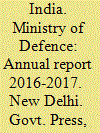

|
|
|
|
|
| Publication |
New Delhi, Govt. Press, 2017.
|
| Description |
217p.pbk
|
|
|
|
|
|
|
|
|
|
|
|
Copies: C:1/I:0,R:1,Q:0
Circulation
| Accession# | Call# | Current Location | Status | Policy | Location |
| 059001 | 353.20954/IND 059001 | Main | On Shelf | Reference books | |
|
|
|
|
| 2 |
ID:
132268
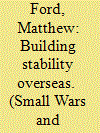

|
|
|
|
|
| Publication |
2014.
|
| Summary/Abstract |
In 2011, the Department for International Development, the Foreign & Commonwealth Office, and the Ministry of Defence launched the Building Stability Overseas Strategy (BSOS). This document sought to integrate cross-government activity as it related to conflict and security so as to 'take fast, appropriate and effective action to prevent a crisis or stop it escalating and spreading'. At the heart of the strategy was the recognition that addressing instability and conflict overseas was morally right and in the UK's national interests. This confluence of foreign policy realism and ethical outlook most clearly found harmony in the acknowledgement that it was cheaper for the international community to avoid conflict than it was to try to manage it. Through an examination of three historical case studies (Uganda 1964-1972, Rhodesia-Zimbabwe 1979-1981, and Sierra Leone 2000-2007), this article seeks to demonstrate just how difficult this seemingly sensible strategic outlook is. In particular, the article shows there are historical parallels in British postcolonial history that very closely resemble contemporary policy choices; that these can be used to define what is different about past and present practice; and, which in turn, can be used to - at least tentatively - mark out the potential strengths and weaknesses in BSOS.
|
|
|
|
|
|
|
|
|
|
|
|
|
|
|
|
| 3 |
ID:
127901
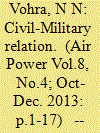

|
|
|
|
|
| Publication |
2013.
|
| Summary/Abstract |
I am very happy to have been asked to deliver the USI national Security Lecture 2013 and to speak on "Civil-Military Relation Opportunities and Challenges".
Before I proceed to reflect on the theme of taday's lecture, I think it would be useful to have reasonable clarity about what exactly do we have in mind when we use the term "civil military relations". I say this because earlier this year, at a seminar held in a defence think-tank at Delhi, a statement was made that "unsatisfactory civil-military relation are having an adverse impact on the functioning of the military in India". While all those who may be involved in studying military matters would understand that this statement refers to the functioning of the defence apparatus, I feel that a free use of the term "civil and military relations" should be best avoided as its has the potential of causing altogether unfounded doubts and suspicions in the minds of millions of people in India.
|
|
|
|
|
|
|
|
|
|
|
|
|
|
|
|
| 4 |
ID:
161005
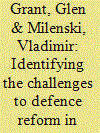

|
|
|
|
|
| Summary/Abstract |
The authors have over 50 years' experience of working on defence in Central and Eastern Europe. They have been intimately involved in trying to reform over 10 national defence organisations including Ukraine. During this work, they often faced intractable resistance and scepticism or conversely, apparent unbounded support, but following this, a complete lack of any actual implementation work by officials. This paper addresses some of the findings and observations identified by the authors that appear to cause these responses and the consequent failure of reform. A new research approach has been taken by using the business and culture tools from Schein, Hofstede and Kotter to try and unravel the underlying causality of that failure. The second part of the paper produces a new process for change based upon the research conclusions to help other advisers and consultants working on reform in the post communist defence arena.
|
|
|
|
|
|
|
|
|
|
|
|
|
|
|
|
| 5 |
ID:
116322


|
|
|
|
|
| Publication |
2012.
|
| Summary/Abstract |
This article makes an original contribution to the ongoing debate about British security policy and strategy by investigating for the first time the conceptual 'gap' separating the Ministry of Defence (MoD) and the Foreign and Commonwealth Office (FCO). It argues that there exists a genuine contrast in how the MoD and FCO conceive of the international system itself and Britain's place within it. The article analyses the indigenous worldviews of the departments - the assumptions, thought-processes, and conceptual paradigms employed by the MoD and FCO. Given the current determination to increase 'joined-up' Government, this problem needs to be acknowledged and discussed.
|
|
|
|
|
|
|
|
|
|
|
|
|
|
|
|
| 6 |
ID:
126412


|
|
|
|
|
| Publication |
2013.
|
| Summary/Abstract |
This paper describes ten recurring problems which afflict the Ministry of Defence's acquisition of complex defence equipment. These problems are manifest in the notorious cost overruns and delays which beset such projects. Some of the problems arise because the projects are large and complex, and perforce must incorporate leading-edge technologies, and because of the diverse cultures of the personnel needed to manage the acquisition process. Others arise from the special (and widely misunderstood) characteristics of defence acquisition, and from the multiple interfaces between the operating services and industrial suppliers in the UK and in other nations. Since diagnosis is useful only if it is accompanied by relevant treatment, the authors propose appropriate remedial action for each of the ten problems they have identified
|
|
|
|
|
|
|
|
|
|
|
|
|
|
|
|
| 7 |
ID:
188250
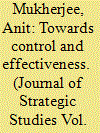

|
|
|
|
|
| Summary/Abstract |
This article analyses India’s Ministry of Defence and its influence on civil-military relations. It argues that, until very recently, the strategic intent of the defence ministry has primarily focused on civilian control over the military. The resultant institutional structure of civilian control compromised the effectiveness of the Indian military. This was due to several features of the country’s model of civilian control, including a lack of civilian expertise, bureaucratic procedures underlying civil-military interactions as well as military autonomy. Acknowledging these problems, the government has currently embarked on reforms to maximize military power. It is doing so mainly by infusing military expertise at the ministerial level. However, this may upend the civil-military dynamic in India and the success of this initiative remains to be seen. Conceptually, this article examines a possibly pernicious effect of a civilian dominated ministry and highlights the importance of expertise in enhancing both control and military effectiveness.
|
|
|
|
|
|
|
|
|
|
|
|
|
|
|
|
| 8 |
ID:
188249
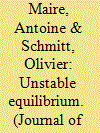

|
|
|
|
|
| Summary/Abstract |
French civil-military relations under the 5th Republic are marked by the imposing figure of the President, because of their role in nuclear deterrence. In that context, the role of the ministry of defence in general, and of its leader (the minister) in particular, is ambiguous: the minister is technically not the highest authority in charge of defence issues (since both the Prime Minister and the President are constitutionally tasked with important responsibilities in the defence realm), but they nevertheless need to find a role between the presidential guidelines and the military demands. In this article, we show that civil-military relations within the French ministry of Defence are therefore characterized by an “unstable equilibrium”: the history of the French MoD is rife with regular swings between the primacy of the military or the primacy of civilians. Overall, the French MoD has adopted a model civil-military relations which is structurally unstable, due to the shifting legitimacy of the military elite within the French bureaucracy and the importance of the personality of the political and military actors involved: without fundamentally altering bureaucratic rules and organization, the power balance between civilian and military actors can quickly evolve. To a degree, this shows the plasticity of French civil-military relations and its ability to adapt to the actors involved, especially the President.
|
|
|
|
|
|
|
|
|
|
|
|
|
|
|
|
|
|
|
|
|